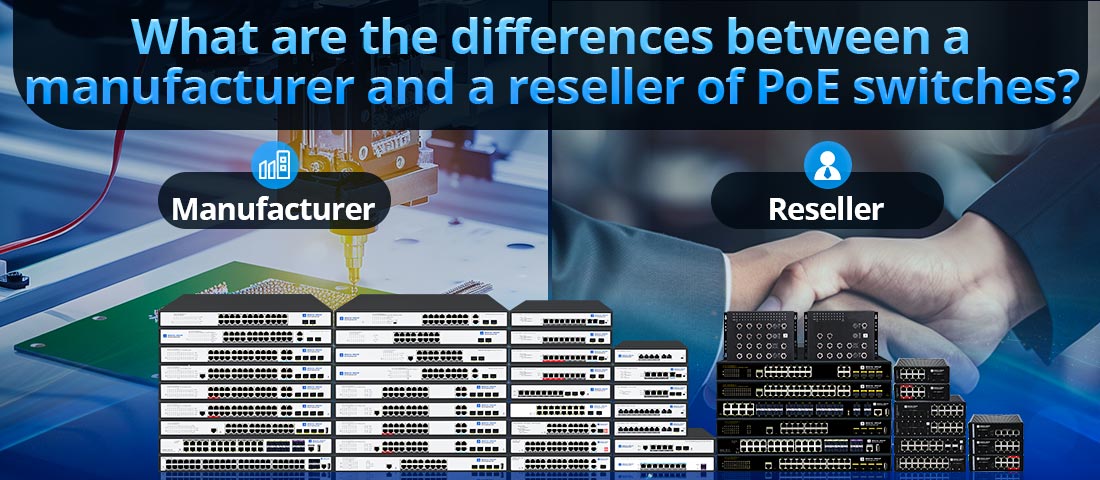
As diferenças entre um fabricante e um revendedor de switches Power over Ethernet (PoE) residem principalmente em suas funções, experiência, operações e no valor que fornecem na cadeia de fornecimento. Abaixo está uma descrição detalhada dessas distinções:
1. Definição e função
Fabricante
--- Um fabricante é uma empresa que projeta, desenvolve e produz Interruptores PoE de matérias-primas ou componentes.
--- Eles são responsáveis pela pesquisa, engenharia e montagem de switches PoE, garantindo que atendam aos padrões da indústria e às especificações do cliente.
--- Os fabricantes normalmente oferecem serviços OEM (Fabricante de Equipamento Original) ou ODM (Fabricante de Design Original), permitindo que os clientes criem produtos personalizados sob sua marca.
Revendedor
--- Um revendedor é um intermediário que compra switches PoE de fabricantes ou distribuidores e os vende a usuários finais, empresas ou outros intermediários.
--- Os revendedores não produzem eles próprios os produtos; em vez disso, eles se concentram em marketing, vendas e distribuição.
--- Eles podem operar como varejistas, revendedores de valor agregado (VARs) ou distribuidores.
2. Personalização do produto
Fabricante
--- Oferece amplas opções de personalização, especialmente se fornecer serviços OEM/ODM.
--- Pode personalizar switches PoE com base em requisitos específicos, como capacidade de energia, configurações de porta ou recursos de software.
--- Normalmente oferece suporte a opções de marca, como posicionamento de logotipo, firmware personalizado ou embalagem exclusiva.
Revendedor
--- Os revendedores geralmente vendem produtos pré-fabricados com opções de personalização limitadas ou nenhuma.
--- Eles podem agrupar switches PoE com outros produtos ou serviços (por exemplo, instalação, suporte técnico) como ofertas de valor agregado.
--- Concentra-se em combinar os produtos disponíveis com as necessidades do cliente, em vez de criar soluções sob medida.
3. Experiência e Conhecimento
Fabricante
--- Profundo conhecimento técnico no projeto e produção de switches PoE.
--- Conhecedor dos mais recentes avanços tecnológicos e padrões da indústria, como IEEE 802.3af/at/bt para PoE.
--- Pode fornecer suporte técnico e consultoria para desenvolvimento de produtos.
Revendedor
--- Conhecimento especializado nas características, aplicações e posicionamento de mercado de Interruptores PoE.
--- Os revendedores podem ter uma compreensão mais ampla de como os switches PoE se integram a outros produtos e sistemas de rede.
--- Depende dos fabricantes para suporte técnico e consultas específicas de produtos.
4. Preços e custos
Fabricante
--- Normalmente oferece preços mais baixos por unidade para compras a granel, especialmente para clientes OEM.
--- O preço reflete o custo de produção, P&D e serviços de customização.
--- Pode exigir quantidades mínimas de pedido (MOQs), tornando-os ideais para empresas que compram a granel.
Revendedor
--- Os preços geralmente são mais elevados do que os dos fabricantes devido às margens adicionais para revenda.
--- Mais flexível em termos de quantidades de pedidos, muitas vezes permitindo compras menores.
--- Inclui custos associados a marketing, armazenamento e suporte ao cliente.
5. Relacionamento com o Cliente
Fabricante
--- Trabalha diretamente com empresas, integradores ou revendedores, com foco em relacionamentos B2B.
--- Fornece parcerias de longo prazo para contratos de produção e fornecimento em grande escala.
--- Oferece garantias e suporte pós-venda para seus produtos fabricados.
Revendedor
--- Concentra-se em relacionamentos B2B e B2C.
--- Envolve-se com um público mais amplo, incluindo pequenas empresas e consumidores individuais.
--- Fornece suporte pós-venda principalmente relacionado à distribuição e instalação, e não a defeitos de fabricação.
6. Estoque e cadeia de suprimentos
Fabricante
--- Mantém instalações de produção e gerencia a cadeia de suprimentos de matérias-primas e componentes.
--- A gestão de estoque concentra-se em componentes e produtos acabados para distribuição em grande escala.
--- Pode enfrentar prazos de entrega mais longos devido aos ciclos de produção, especialmente para pedidos personalizados.
Revendedor
--- Mantém estoque pronto para venda adquirido de fabricantes ou distribuidores.
--- Podem entregar produtos com mais rapidez, pois normalmente armazenam switches PoE pré-fabricados.
--- Capacidade limitada de atender especificações exclusivas de produtos devido à dependência do estoque existente.
7. Proposta de valor
Fabricante
--- Oferece acesso direto a switches PoE personalizados e de alta qualidade a preços competitivos para compradores em massa.
--- Apoia a inovação por meio de P&D e engenharia avançada.
--- Ideal para empresas que buscam soluções de rede personalizadas ou compras em grande escala.
Revendedor
--- Oferece conveniência ao oferecer uma variedade de marcas e modelos de switches PoE em um só lugar.
--- Ideal para pequenas empresas ou consumidores que precisam de acesso rápido a produtos prontos.
--- Agrega valor por meio de serviços de agrupamento, consultoria e suporte técnico.
8. Exemplos
Fabricante
--- Um Interruptor PoE O fabricante pode produzir uma variedade de produtos, desde switches básicos de 8 portas até switches avançados de nível industrial com saídas de energia personalizadas.
--- Eles costumam fazer parceria com outras empresas para serviços OEM/ODM, permitindo que o parceiro reformule a marca e venda os switches.
Revendedor
--- Um revendedor pode oferecer switches PoE de vários fabricantes, oferecendo aos clientes uma escolha de marcas e faixas de preço.
--- Eles também podem fornecer serviços de instalação ou empacotar os switches com outro hardware de rede.
Conclusão
Em resumo, fabricantes e revendedores desempenham funções distintas na cadeia de fornecimento de switches PoE. Os fabricantes se concentram na criação e personalização de produtos de alta qualidade, tornando-os ideais para compradores em grande quantidade e empresas com necessidades específicas. Os revendedores preenchem a lacuna entre fabricantes e usuários finais, fornecendo soluções prontas, conveniência e serviços de valor agregado. As empresas devem escolher entre os dois com base em suas necessidades específicas, como personalização, preços, tamanho do pedido e requisitos de suporte.